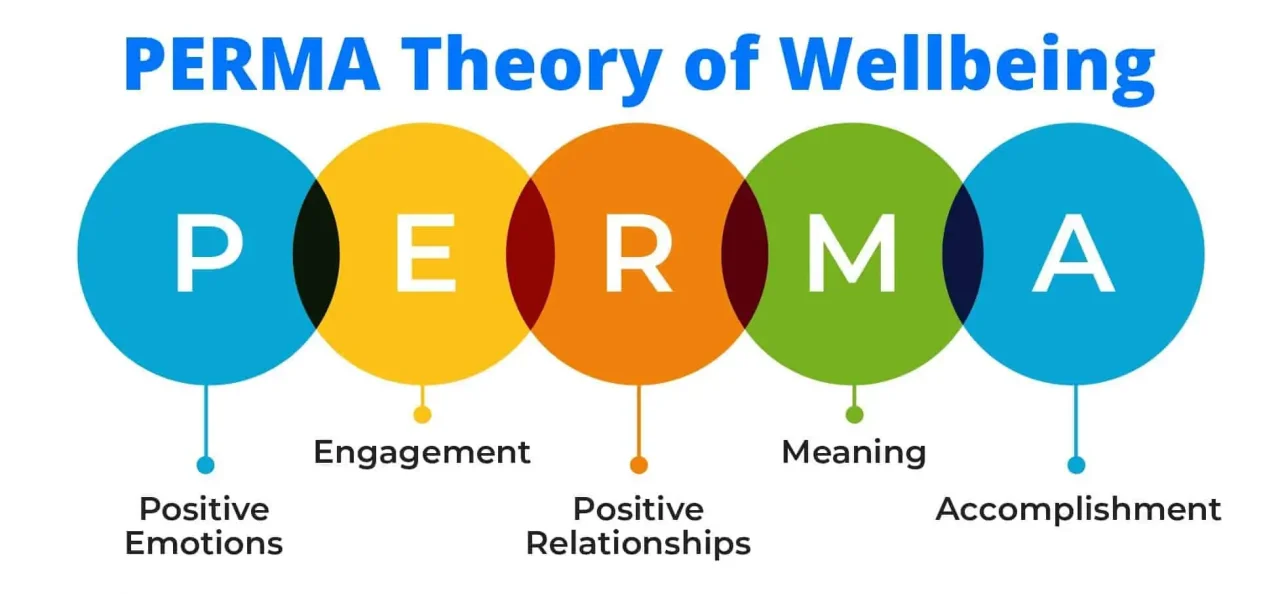The science of happiness, known as positive psychology, has been a groundbreaking field since its inception in 1998. Positive psychologists have unearthed the many ways and advantages of being happier.
- Happiness can help us live longer and healthier lives, earn more money, avoid depression, and be more germ-resistant.
- Happier people can handle stress better and bounce back quicker and stronger from setbacks.
- Happiness has links to a healthier heart rate, blood pressure, and heart rate variability.
5 Incredible Findings From Research On Happiness In Psychology
Happiness researchers have shown how we can live happier lives, whatever our current happiness level may be.
Here are five crucial strategies to be happier from studies that you can embrace for a brighter 2024:
1. Happiness & Mind-Wandering (And Mindfulness)
“A wandering mind is an unhappy mind.”
Researchers Matthew Killingsworth and Daniel Gilbert found that our minds wander at least 30% of the time during every activity except making love.
Surprisingly, their study also revealed that people were less happy when their minds were wandering than when they were not, and this was true during all activities.
They wrote:
“In conclusion, a human mind is a wandering mind, and a wandering mind is an unhappy mind. The ability to think about what is not happening is a cognitive achievement that comes at an emotional cost.”
— Killingsworth & Gilbert

And the antidote to mind-wandering is mindfulness.
Now, here’s the good thing: other researchers have found definite links between mindfulness and happiness.
This study in the Journal of Positive Psychology found that those who routinely practiced mindfulness experienced greater well-being, life satisfaction, and happiness.
So, if we stop multitasking (which is actually mind-wandering back and forth), and instead learn to pay attention to the present moment, we can reduce our stress and anxiety, and increase our overall happiness.
2. The Power of Gratitude In Making You Happier
We must thank the psychology researchers to have explored the impact of gratitude on happiness.
Gratitude is the mental state of being thankful and appreciative of someone or something.
A study published in the Frontiers in Psychology found that people who regularly expressed gratitude reported higher levels of well-being and satisfaction in their lives.
The study authors wrote:
“The gratitude intervention managed to increase positive affect, subjective happiness and life satisfaction, and reduce negative affect and depression symptoms.”
— Lomas, Medina, & Ivtzan (2019)
Gratitude also counteracts hedonic adaptation to positive events.
Hedonic adaptation is the scientific term for the fact that happiness (that comes from a particular success or positive change) fades over time.
[A related phenomenon is the arrival fallacy, which means when you arrive at your goal, you often do not feel as happy as you expected.]
But research says, being grateful can prolong your positive feelings toward positive events, and prevent you from taking people and things for granted (Lyubomirsky, Sheldon, & Schkade, 2005).
This is because gratitude gently nudges you to keep your focus on the good things in your life, rather than dwelling on the negatives.
So, be grateful for what you already have, instead of focusing on what you do not have, and see a boost in your happiness and overall well-being.
3. The Happiness Benefits of Self-Compassion
Self-compassion has also been found to be a critical factor in our happiness.
We all experience difficult emotions, like anger, anxiety, or sadness, that can lead to mental pain and emotional suffering. Moreover, many of us are self-critical and self-shaming.
The good news is, we can learn to cope better with our difficult emotions by being more compassionate to ourselves.
Self-compassion is allowing ourselves to open up and be touched by our own suffering, not avoiding or disconnecting from it.
It also means offering ourselves a non-judgmental understanding of our pain, inadequacies, and failures, so that we can see our experiences as a part of a larger human existence.
A study published in the Journal of Clinical Psychology found that those who practice self-compassion are more likely to experience greater well-being and happiness.
This is because self-compassion helps us to be more accepting of ourselves, including our imperfections, leading to an overall increase in self-esteem and happiness.
Dr. Kristin Neff’s research (you can read in her brilliant book Self-Compassion) divides self-compassion as having three parts – self-kindness, mindfulness, and common humanity (the last reminds us that we are human and humans make mistakes).
“All humans are flawed works-in-progress; everyone fails, makes mistakes, and engages in dysfunctional behavior. All of us reach for things we cannot have, and have to remain in the presence of difficult experiences that we desperately want to avoid. Just as Buddha realized, some 2,600 years ago, we all suffer.”
— Makransky, 2012
4. The Happiness Advantage of Sleep
Happiness researchers also highlight the importance of sleep for happiness.
Less sleep, or poor sleep, can make us irritable, moody, anxious, unfocused, and error-prone.
On the other hand, proper and adequate sleep not only protects us from these negative next-day effects, but also makes us more optimistic, creative, decisive, energetic, and easygoing.
This study published in the journal Health Psychology found that those who get enough sleep are more likely to experience higher levels of well-being and happiness.
The study found that getting more sleep the night before may help you appreciate positive events more. On the flip side, they found, sleep loss can decrease positive emotions on stressful days as well as reduce positive responses to positive events.
So, if you did not sleep well last night, your response to any great news will be lukewarm today.
Remember, sleep is a non-negotiable for physical and mental restoration, allowing us to face each day with renewed energy and a refreshed mind.
5. Happiness Benefits of Spending Time Outdoors
Researchers have found spending time in nature, such as going for a forest walk, can boost happiness and emotional well-being.
Nature Therapy (NT) includes many activities that involve interacting with nature-filled environments or natural elements (Song et al., 2016). This idea gained more attention during the COVID-19 crisis-induced worldwide restrictions (Pouso et al., 2021).
This study published in the International Journal of Environmental Health Research found people who spend time in nature are more likely to experience higher levels of well-being and happiness.
They reasoned that being in nature helps reduce stress and increase feelings of peace and calm, leading to an overall increase in happiness.
And this study found that even watching a simulated walk through a pine forest, not actually walking, increased happiness substantially more than watching footage of urban environments.
The study authors wrote;
“We found that a virtual walk through a pine forest was capable of improving psychological well-being and invoking feelings of restorativeness.”
— Brancato, Van Hedger, & Berman, 2022
So, a “green prescription” that advises people to leave the house to enjoy nature or do activities in nature can also produce feelings of comfort and improve mental health.
Japanese researchers call this “Shinrin-Yoku (Forest Bathing).”
“Happiness” According To Psychology Researchers
Happiness, or subjective well-being (SWB) as positive psychology researchers call it, is having positive emotions and a sense of overall life satisfaction. It involves having a sense of well-being, a purpose and meaning in life, and positive relationships with others.
Happiness is not just the absence of negative emotions or the presence of happy expressions.

Positive psychologists research what makes happy people happy and then help us cultivate these factors into our lives so that we can be happier.
The world’s longest-running research on happiness suggests that strong relationships are the strongest predictors of life satisfaction, physical health, longevity, and financial success (Harvard Study On Happiness).
The Harvard Grant Study reveals that close relationships, more than money or fame, keep us happy and shield us from life’s discontents, and mental and physical decline.
“The surprising finding is that our relationships and how happy we are in our relationships has a powerful influence on our health.”
— Robert Waldinger, professor of psychiatry at Harvard Medical School who directs the Harvard Study of Adult Development
World Happiness Report
The United Nations Sustainable Development Solutions Network has published the World Happiness Report annually since 2012. This report evaluates countries based on six criteria: social support, income, health, freedom, generosity, and lack of corruption.
The World Happiness Report 2023 found:
- People are happiest when they are healthy, have faith in their government, experience generosity, and engage in cooperative and meaningful interactions with others.
- Average happiness levels and country rankings remained stable during the three COVID-19 years.
- Pro-social behavior, such as acts of kindness, charity donations, and volunteering, increased above pre-pandemic levels.
- Kindness leads to and results from happiness, with benevolence being a prominent feature in recent reports.
- These acts of kindness are about 25% more frequent than before the pandemic.
Further Reading
- 10 Simple Things That Make Me Happy
- Marcus Aurelius On Having A Happy Life (Stoicism)
- What Millions of Books Reveal About 200 Years of Happiness
- What Does “Flourishing” Mean (And How To Measure It On A Scale)
- Valuing Time Over Money Predicts Happiness After a Major Life Transition
Positive Psychology Journals:
- Journal of Happiness Studies. Link: https://www.springer.com/journal/10902
- Journal of Positive Psychology and Wellbeing. Link: https://journalppw.com/index.php/JPPW
- International Journal of Applied Positive Psychology. Link: https://www.springer.com/journal/41042/
• • •
√ Also Read: How to start gratitude practice to raise your daily happiness?
√ Please spread the word if you found this helpful.
• Our Story!